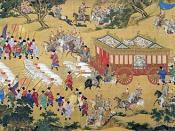The period 960 to 1400 covers a time of significant historical changes in
China. The Song, Yuan and early Ming dynasties saw migration to the south,
the birth of a new elite in the educated class, increased
commercialisation, a revival of the influence of Confucianism and, in the
very early years of the 12th century until 1368, invasion by a foreign
force. Despite such developments, previous studies suggest that the basic
institutions of property and marriage were not among these changes and
remained fairly static. Indeed, for men, whose rights have changed very
little for centuries, this was the case. It is only when examining the
rights of women with regards to property and marriage that the effects of
the aforementioned changes become visible.
In 960 AD General Chao K'uang-yin founded the new Song dynasty at
K'ai-feng. This is the starting point from which we will trace the change
in women's rights which In 960, were those granted under the previous T'ang
dynasty. The basic rules of inheritance were ''older and younger brothers
receive equal portions'' and ''sons receive their father's share''. When a
father died, each son received an equal share of his land on which to
establish his own patriline. Female property, under traditional Confucian
ideology, was rendered insignificant in the division of household property.
The dowry a wife brought with her into the marriage remained the property
of her and her husband.
The tradition of a dowry was an ancient one. As both P. Ebrey and J.
Holmgren confirm, the institution of dowry turned marriage into a vital
means of transmitting property. Depending on the family's wealth, a dowry
could include fine materials, clothes, strings of cash, precious metals,
jewellery and landholdings. The richer a dowry a family could produce, the
richer a family their daughter could...



Good
Very good historical references
0 out of 0 people found this comment useful.